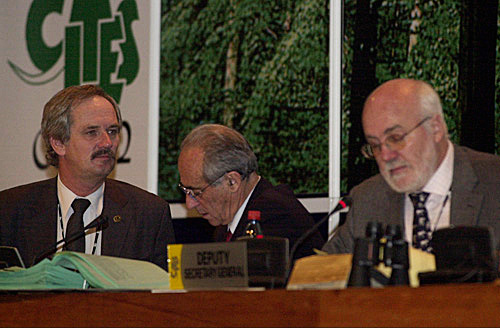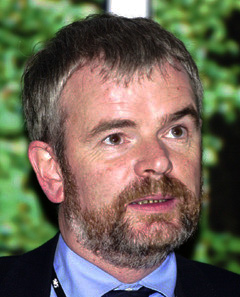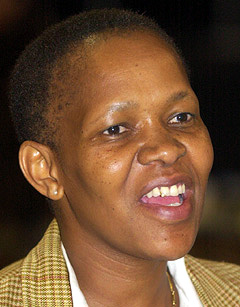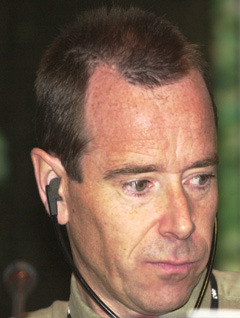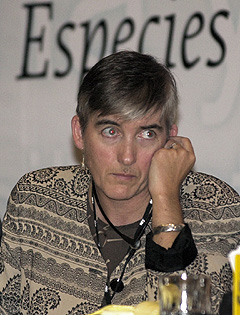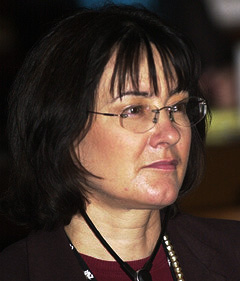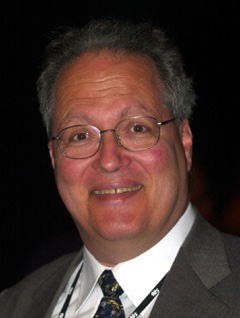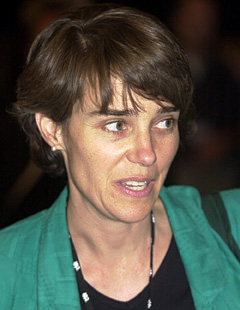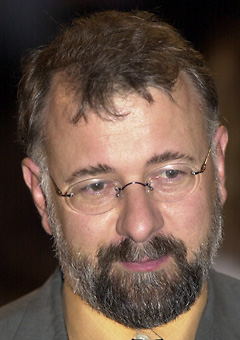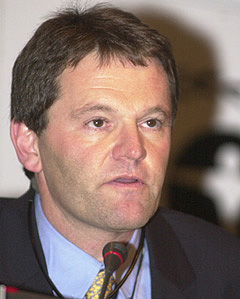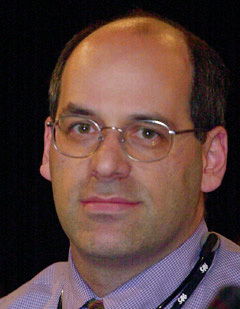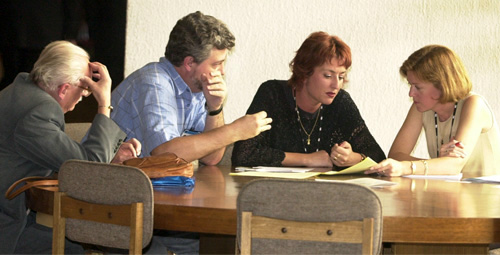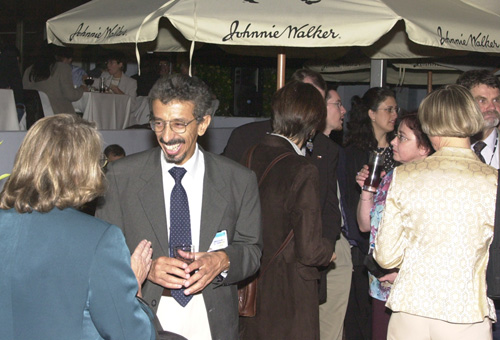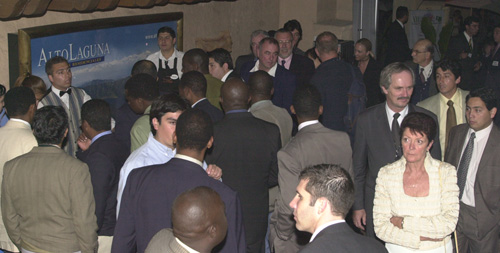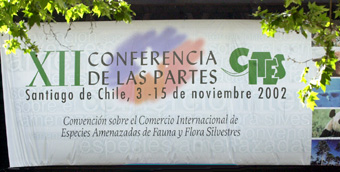|
Tuesday, 5 November 2002
Delegates convened in a morning Plenary session to hear the Credentials Committee report, and to consider revision of the Convention's Action Plan, cooperation with other organizations, and reports of the African elephant and Caribbean hawksbill turtle dialogue meetings. Committees I and II met in the afternoon to begin their respective work.
PLENARY
Credentials Committee Chair Lauprasert (Thailand) opened the Plenary by reporting that 55 countries have not yet registered their credentials.
REVISION OF THE ACTION PLAN OF THE CONVENTION: The Secretariat introduced the Revision of the Action Plan of the Convention (Doc.12), noting that it: is part of the CITES strategic vision; has been prepared by a Standing Committee working group; and includes a detailed annex outlining the revisions. He outlined the working group's recommendations to assign a group or subcommittee to: review the Action Plan and identify necessary changes; develop an evaluation tool or strategy to evaluate the Strategic Plan's goals; and provide recommendations for changes. Following a discussion on ensuring adequate review and adoption of policies and legislation that may have an impact on species conservation or CITES implementation, and on facilitating exchange of information, the Plenary endorsed the revised Action Plan.
 Listen to the Secretariat Listen to the Secretariat
 Listen to the EU Listen to the EU
 Listen to Mexico Listen to Mexico
 Listen to Peru Listen to Peru
 Listen to the Secretariat Listen to the Secretariat
 Listen to IWC Listen to IWC
DIALOGUE MEETING REPORTS: African Elephant: Denis Koulagna Koutou (Cameroon), Chair of the African elephant dialogue meeting, presented its communiqué (Doc.20.1). He highlighted the compromise reached between range States, with the exception of Kenya, to enable Botswana, Namibia, South Africa and Zimbabwe to sell their legally obtained ivory stocks to finance conservation programmes and benefit local communities, under supervision by the Secretariat. The agreement further proposes to set a revised annual export quota according to Resolution Conf. 10.10 (Rev.) on domestic manufacturing and trade in elephant specimens.
KENYA highlighted concerns regarding: the process by which consensus was forced; controversies in reviewed studies; lack of means and law enforcement to control the illegal ivory trade in Africa and Asia; implications of reopening the ivory trade; lack of baseline data; compromising the Monitoring of Illegal Killing of Elephants (MIKE) system; and overloading the Secretariat. She also called for information on an illegal ivory shipment seized in Japan. JAPAN replied that there was an ongoing investigation and noted that it would report back on the issue. He also urged Parties to respect the outcome of the African dialogue. CHINA highlighted efforts to control illegal trade in ivory, noting that many in the country wrongly believe that the ivory trade has been resumed. BOTSWANA noted efforts to undermine the integrity of the communiqué and clarified that: the African compromise does not reopen trade; range States use all available expertise; and all participants were given the opportunity to state reservations. She stressed the importance of producing a common plan.
 Listen to Kenya Listen to Kenya
 Listen to China Listen to China
 Listen to Botswana Listen to Botswana
Caribbean Hawksbill Turtle: Noel McGough (UK) presented the report (Doc. 20.2) on two dialogue meetings carried out in Mexico City and the Cayman Islands, aimed at strengthening regional cooperation on the hawksbill turtle issue. Major outcomes include, inter alia: a proposed draft resolution that deals with regional conservation issues; implementation of a Caribbean strategy for hawksbill turtle conservation; and the decision to convene another dialogue meeting before CITES COP-13. MEXICO and JAPAN supported the resolution and decisions, while CUBA opposed the resolution.
COMMITTEE I
Chaired by David Morgan (UK), Committee I discussed export quotas for leopards and markhors, transport of live animals, conservation of and trade in tortoises and freshwater turtles, trade in sea cucumbers, biological and trade status of Harpagophytum (Devil's Claw), and trade in hard corals.
APPENDIX I SPECIES QUOTAS: Leopard: The Secretariat introduced its report on quotas for leopard hunting trophies and skins for personal use (Doc.23.1.1). Delegates were asked to consider repealing a resolution on quotas for leopard, or remove reporting requirements requested under the resolution. TANZANIA, INDIA, the EU, the US and the IWMC-the World Conservation Trust opposed, while SOUTH AFRICA supported, repealing the resolution. Delegates agreed to retain the resolution, but decided to remove the special reporting requirements. TANZANIA presented, and Parties endorsed, its proposal to increase its annual export quota for leopard hunting trophies and skins (Doc.23.1.2) from 250 to 500, emphasizing that this would benefit conservation and support poverty eradication.
Markhor: The Secretariat recommended repealing the resolution on export quotas for Markhor (Doc.23.2), or removing special reporting requirements within the resolution. PAKISTAN supported repealing the resolution or enhancing its Markhor quota, a request many delegations supported. The EU opposed repealing the Resolution. The US questioned whether a quota increase could be requested without prior submission of a proposal. Chair Morgan noted that Resolution Conf. 9.12 regarding this issue was ambiguous. The Secretariat stated that a precedent had been set at COP-8 for such requests. Delegates agreed to remove special reporting requirements and increase Pakistan's export quota from 6 to 12.
LIVE ANIMALS TRANSPORT: The Secretariat introduced its document on the transport of live animals (Doc.25), which focused on the International Air Transport Association's (IATA) Live Animals Regulations and transport-related mortality. Delegates endorsed the draft decision, requesting the Animals Committee, in collaboration with the Secretariat and NGOs, to: develop recommendations regarding transport by road, rail or ship; investigate cost-effective options for containers and packaging materials to be included in the IATA Live Animals Regulations; develop recommendations on proper transportation; and report progress to COP-13. The Secretariat was requested to take steps to develop a formal Memorandum of Understanding with IATA on cooperation and training.
TORTOISES AND FRESHWATER TURTLES: The Secretariat introduced the document on the conservation of and trade in tortoises and freshwater turtles (Doc.39), highlighting that review of the issue is ongoing. He reported on a technical workshop held in China in March 2002 and on capacity-building efforts in Asia. The workshop requested the Secretariat to assist in seeking financial and technical support to develop management guidelines for tortoises and freshwater turtles. Delegates accepted the suggested amendments to Resolution Conf. 11.9 and endorsed the resulting draft resolution and decisions.
SEA CUCUMBERS: The US introduced its proposal on trade in sea cucumbers in the families Holothuridae and Stichopodidae (Doc.45). He noted that harvest pressures on the species have increased due to growing international demand and that data on their status and trends is limited. The US, supported by others, requested an information sharing dialogue to evaluate the sea cucumbers' status and to consider a possible CITES listing. JAPAN, supported by CUBA, CHINA and MALAYSIA, opposed the proposal. The US, supported by SWEDEN, KENYA and CANADA, suggested resolving this issue in an informal working group.
HARPAGOPHYTUM: Plants Committee Chair Margarita Clemente (Spain) introduced, and delegates endorsed, the report on the biological and trade status of Harpagophytum (Doc.46). SOUTH AFRICA and UGANDA supported the EU suggestion to list the species in Appendix III.
HARD CORALS: Regarding trade in hard corals (Doc.10.1), Parties agreed to direct the Animals Committee to consider and recommend practical means of distinguishing fossilized from non-fossilized corals in international trade and provide a report at COP-13. |
|
|
COMMITTEE II
CONVENTION TITLE: Chair Anne-Marie Delahunt (Australia) introduced revisions to the Committee's working programme and welcomed comments on the Convention's title (Doc.14(Rev.1)). Secretary-General Wijnstekers noted that the proposed amended subtitle (CITES - Convention on Trade in Wild Flora and Fauna) attempts to better reflect the Convention's content and addresses difficulties related to listing commercial timber and fish species. The EU, the RUSSIAN FEDERATION, and Saint Lucia, on behalf of CENTRAL AND SOUTH AMERICA AND THE CARIBBEAN, opposed the proposal, stating it would lead to a revision of the Convention. ERITREA and THE PHILIPPINES supported the proposal, with the latter suggesting amending it to refer to international trade. The Secretariat withdrew the proposal.
ESTABLISHMENT OF COMMITTEES: CHILE, supported by the Secretariat, proposed that the level of regional representation in the Animals and Plants Committees (AC and PC) be identical to the composition of the Standing Committee (SC) (Doc 13.1). Animals Committee Chair Hoogmoed said that this would unnecessarily increase the numbers in both Committees. KENYA, SWITZERLAND, JAPAN and SIERRA LEONE agreed with the proposal, but expressed concern about its financial implications. ECUADOR, BRAZIL, COSTA RICA, and CUBA supported the proposal, highlighting consensus among Central and South American and the Caribbean countries.
The EU called for examining the budget implications before deciding on the issue. Following a lengthy discussion and three rounds of voting, the proposal failed to reach the required two-thirds majority vote and was defeated by 41 in favor, 34 against and nine abstentions.
The US introduced its proposal on enhancing implementation of the Convention (Doc. 13.2), which includes the following options: maintaining the AC and PC with a joint implementation subcommittee; establishing implementation subcommittees under the AC and PC; or consolidating the AC and PC under a single scientific committee and establishing an administrative and policy-making committee.
The Secretariat introduced the review of the committee structure (Doc.13.3), which included two options: maintaining the SC and creating a scientific committee to replace the AC and PC; or maintaining the SC and creating a scientific committee and an implementation committee. Delegates opposed the creation of a scientific committee to replace the AC and the PC. AUSTRALIA, supported by the EU, FIJI, NORWAY and KOREA, suggested creating a subcommittee under the AC and PC to deal with implementation issues. Delegates agreed to a establish a working group, chaired by the US, to consider implementation issues under the Convention's existing structure. The working group met on Tuesday evening to start discussion on the issue and will report back to Committee II on Thursday morning.
|
|
